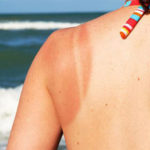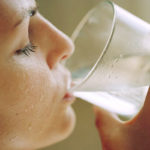Spicy food and acne: Is there a connection? This is a question that many people have asked, and today, we aim to provide a detailed answer. So, can spicy food cause breakouts? The short answer is YES. But why is that? One of the main reasons for acne formation is the build-up of sebum in the pores, creating an ideal environment for acne-causing bacteria to thrive. This leads to inflammation and the appearance of pimples. Additionally, according to a study published in the Journal of Clinical and Aesthetic Dermatology, acne is primarily caused by skin inflammation. Spicy foods can trigger an inflammatory response in the body, increasing the likelihood of breakouts.
1. Does Eating Spicy Food Cause Acne?
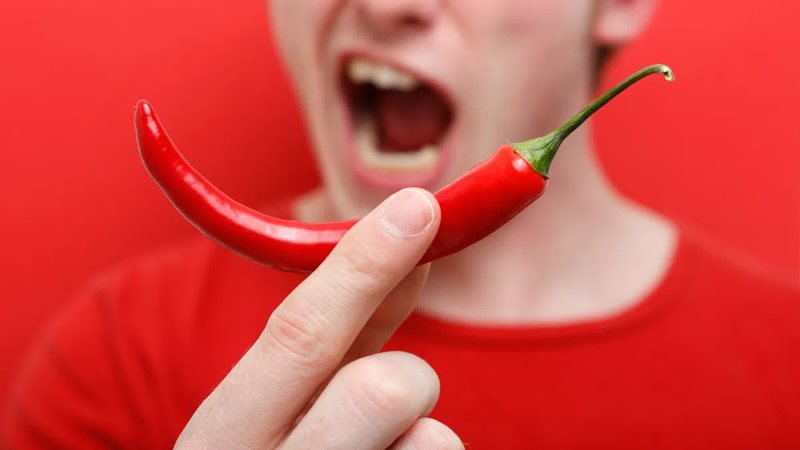 Can Spicy Food Cause Acne?
Can Spicy Food Cause Acne?
As mentioned, the answer is yes. However, it’s important to understand the underlying reasons. One of the key factors is the inflammatory response that spicy foods can trigger in the body. This inflammation can lead to skin issues, including acne.
Now, if you’re wondering about the connection between spicy foods containing chili peppers and acne, it’s important to note that capsaicin, the active compound in chili peppers, has potent anti-inflammatory properties. So, contrary to popular belief, chili peppers themselves don’t directly cause acne.
2. What Are the Reasons for Acne After Eating Spicy Food?
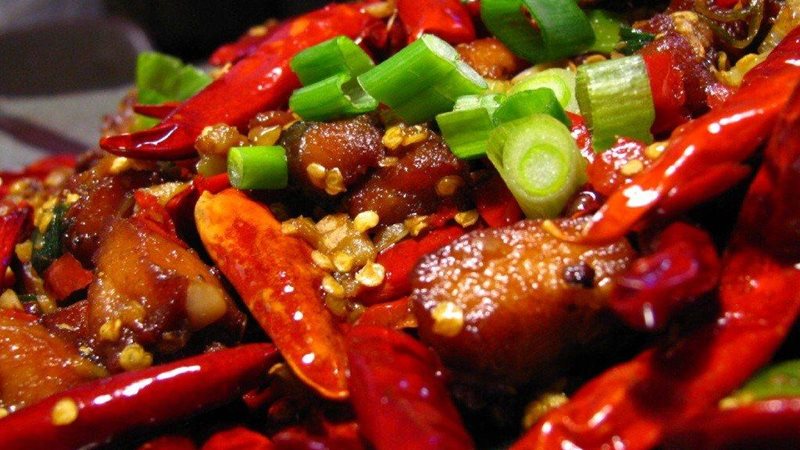 Reasons for Acne After Eating Spicy Food
Reasons for Acne After Eating Spicy Food
Here are two main reasons why spicy food can lead to breakouts:
-
High Salt Content: Spicy dishes, such as Thai hot pot, instant noodles, and spicy noodles, tend to be very high in salt. Consuming these foods regularly can lead to excess salt intake, which can then cause acne breakouts.
-
Allergic Reaction to Lycopene: Another reason for acne flare-ups after eating spicy food could be an allergy or sensitivity to lycopene. This compound is commonly found in chili peppers and tomatoes, and it can alter the skin’s natural pH, leading to allergic reactions and acne.
3. What Foods Are Considered Spicy and Hot?
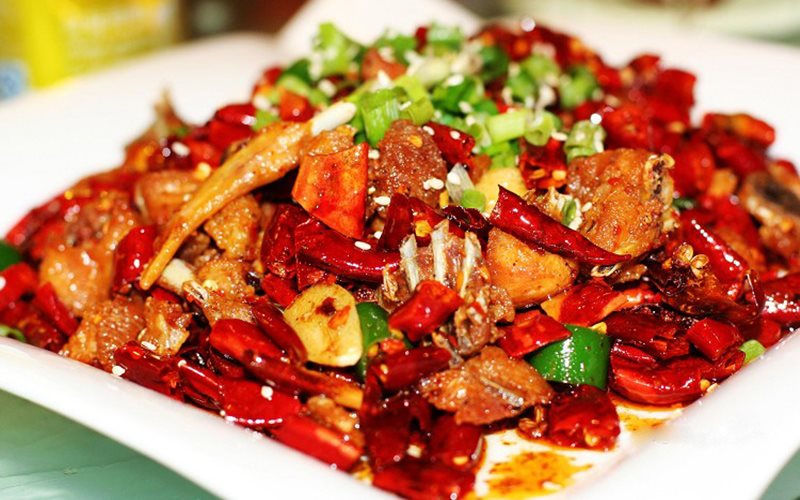 Spicy and Hot Foods
Spicy and Hot Foods
According to traditional medicine, spicy and hot foods are those that create a sense of heat and dryness in the body. This sensation of heat is not due to high temperatures but rather an internal feeling of warmth. Some examples of spicy and hot foods include various types of red peppers, dragon fruit, jackfruit, longan, and lychee.
4. Is Eating a Lot of Spicy Food Good or Bad for Your Skin?
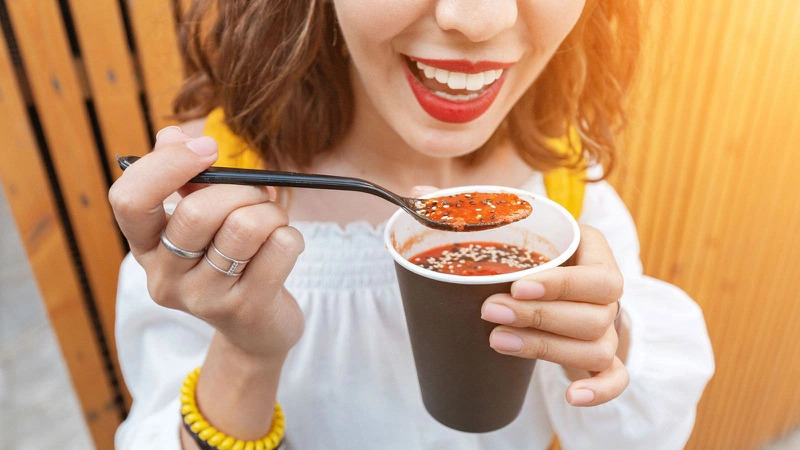 Effects of Eating a Lot of Spicy Food on Skin
Effects of Eating a Lot of Spicy Food on Skin
Consuming excessive amounts of spicy food is not beneficial for your skin or overall health. Spicy foods have a high moisture-absorbing capacity, and eating too much can lead to dry and rough skin. This lack of moisture can contribute to the formation of inflammatory acne.
Additionally, spicy foods can cause the blood vessels in the face to dilate, resulting in a flushed appearance. As for your health, a diet rich in spicy foods can lead to digestive issues, affecting your intestines and stomach. A study of 570,000 people found that those who frequently consumed spicy foods had a 30% higher risk of developing intestinal and stomach problems, including cancer and ulcers.
5. How Does Spicy Food Affect Your Health?
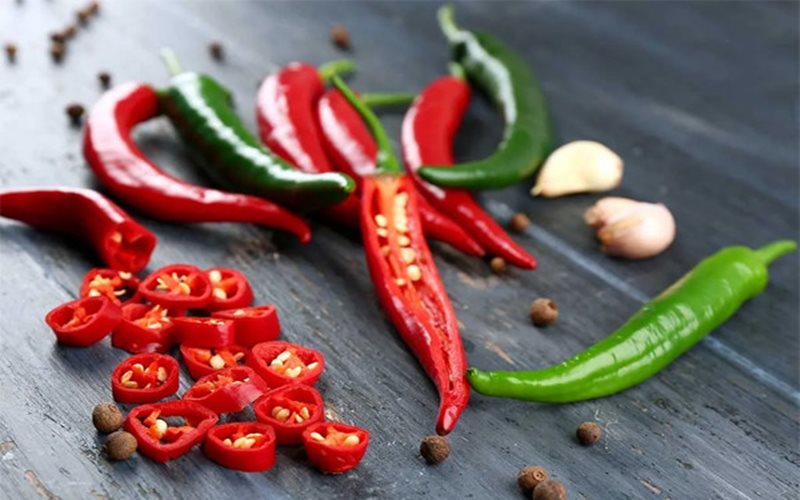 Effects of Spicy Food on Health
Effects of Spicy Food on Health
While spicy foods can trigger breakouts and cause a heated sensation, consuming them in moderation can offer some health benefits:
-
Boosts Metabolism: Capsaicin, found in chili peppers, helps improve the body’s metabolic rate.
-
Aids in Weight Loss: Spicy foods reduce sugar cravings, limiting the intake of fatty foods.
-
Protects the Stomach: Capsaicin controls stomach acid levels, helping prevent stomach ulcers.
-
Promotes Heart Health: People who eat spicy foods tend to have lower cholesterol levels, reducing the risk of cardiovascular diseases.
-
Reduces Cancer Risk: Capsaicin has been shown to inhibit and prevent cancer cell growth.
6. How to Eat Spicy Food Without Breaking Out
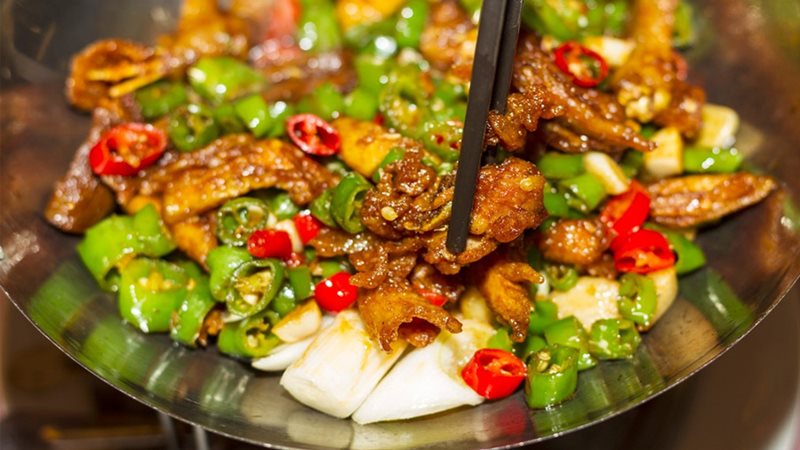 Tips for Eating Spicy Food Without Breaking Out
Tips for Eating Spicy Food Without Breaking Out
It is possible to enjoy spicy food without worrying about acne breakouts by following these simple tips:
-
Drink plenty of water after eating spicy food to flush out toxins and maintain skin hydration.
-
Consume probiotic-rich foods after a spicy meal.
-
Include cooling foods such as cucumbers and melons in your diet.
-
Maintain a regular skincare routine to prevent sebum build-up and keep your skin moisturized.
-
Exercise regularly to help eliminate toxins from the body after consuming spicy foods.
7. Precautions When Eating Spicy and Hot Food
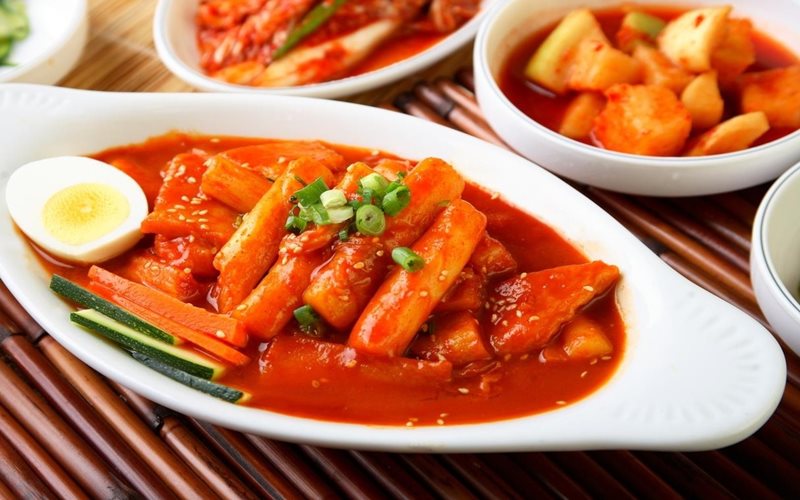 Precautions When Eating Spicy and Hot Food
Precautions When Eating Spicy and Hot Food
Here are some important precautions to keep in mind when consuming spicy and hot foods:
-
Avoid eating spicy and hot foods in excessive quantities daily, as it can negatively impact your health and skin. It is recommended to limit spicy food consumption to 1-2 times per week.
-
Consume yogurt or drink herbal teas to cool down and soothe your body after eating spicy foods.
-
If you have stomach, heart, or hemorrhoid issues, it is advisable to limit your intake of spicy foods. The same applies to pregnant and breastfeeding women.
In conclusion, this article has provided a comprehensive overview of the relationship between spicy food and acne. We hope it has answered your questions and equipped you with the knowledge to make informed decisions about your diet and skincare routine. Take care!
Sources: hebora.vn, nhathuoclongchau.co

























